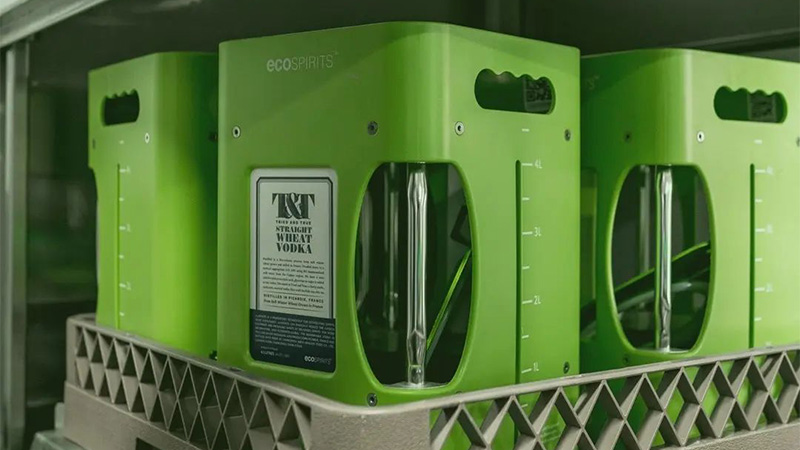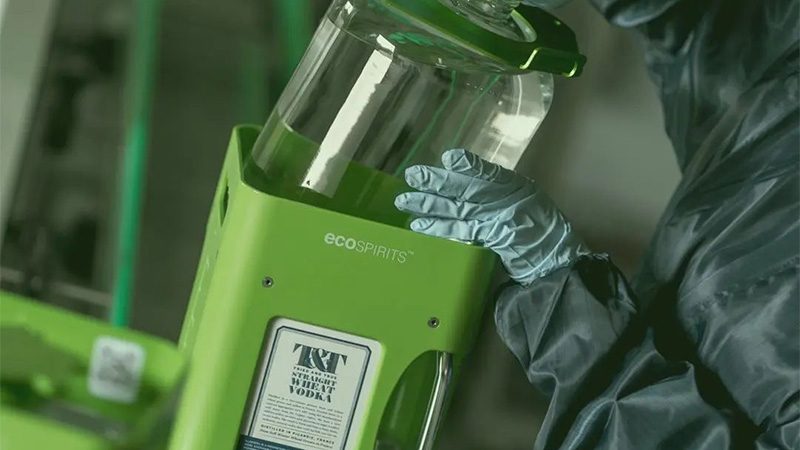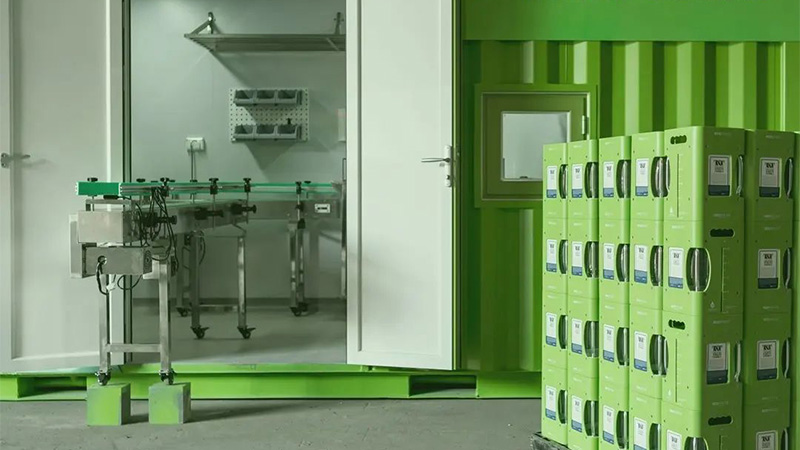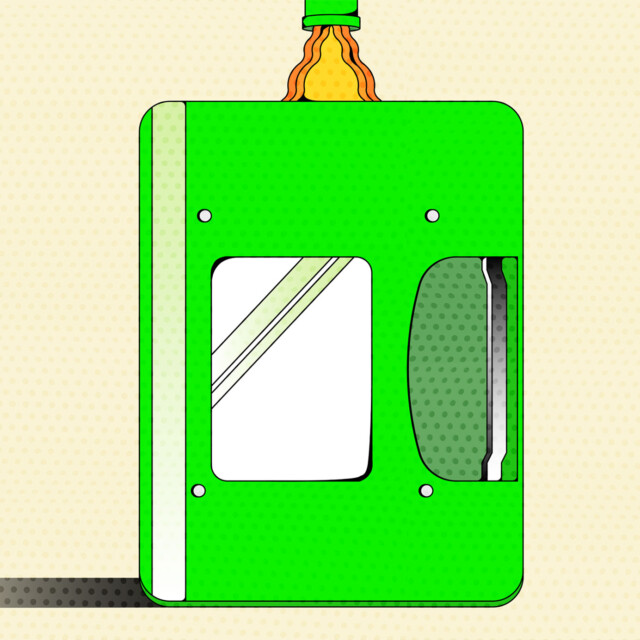Sustainability is one of the buzziest of buzzwords in an industry devoted to helping you get buzzed. But most of the big talk on the subject is little more than that — talk. Developing and deploying real, impactful solutions, especially those with the potential to scale, remains something of an outlier.
Striving for a more sustainable future isn’t just the right thing to do, either. It’s become an important factor for drinkers as they choose where, how and with whom to wield their drinking dollars. According to Bacardi Limited’s 2023 Cocktail Trends Report, “more than half of respondents stated that recyclable packaging was crucial to their liquor and spirit considerations.”
Enter ecoSPIRITS, a tech company with an extensive bar world background that’s striving to create what it refers to as a closed-loop or circular-spirits economy, with the use of refillable totes replacing single-use bottles. “By dramatically reducing packaging and transport, ecoSPIRITS provides both a powerful cost advantage and a transformative carbon footprint reduction,” says Zdenek Kastanek, the managing director for ecoSPIRITS USA.
According to ecoSPIRITS’ data, 40 billion glass spirit bottles are produced annually, generating 22 million tons of carbon emissions. For each single-use glass bottle shunned in favor of refillable, large-format totes, 550 grams of emissions are saved. Drilled down even further, that’s about 30 grams of carbon emissions saved per cocktail. To put those potential savings into perspective, 291.1 million 9-liter cases of spirits were sold in the U.S. in 2021, according to the most recent economic report from the Distilled Spirits Council of the United States. While there are different sizing and packaging formats, on the whole that represents almost 3.5 billion 750-milliliter bottles.
Is ecoSPIRITS the Real Deal?
ecoSPIRITS was founded in 2018 by the folks behind Asian bar world power brokers Proof & Company. On the strength of the founders’ established industry bonafides, ecoSPIRITS has built deep inroads across its existing network, with its services available in 30 major cities across 15 countries, including more than 1,000 bars, restaurants, and hotels. The list includes luxury heavy hitters such as Rosewood Hotels and Four Seasons Hotels & Resorts in Asia Pacific, and forward-thinking cocktail hot spots, such as Lyaness in London and Penicillin in Hong Kong.

Simone Rossi, Rosewood Hong Kong‘s director of bars, is one such industry professional whose connections to Proof & Company led him down a path of discovery that ended with ecoSPIRITS. “The brand was [to my knowledge] the first to dive into sustainable packaging in the bar industry, which has a big impact on the environment,” she says. “We take sustainability and waste reduction seriously, especially in our day-to-day operations.”
It’s one thing to leverage existing connections to establish a reduced footprint foothold, but the idea wouldn’t go very far without equally viable connections on the other end of the equation: the companies making the liquid that enters those totes.
Crucial to getting them behind the bar, then, is partnering with spirits brands that bars are already using. To that point, ecoSPIRITS has launched partnerships with Pernod Ricard brands in Singapore, including Beefeater, Havana Club, and Absolut Vodka; Diageo in Indonesia with Smirnoff Vodka; and Remy Cointreau in the U.K. with Cointreau and Mount Gay.
The big picture, then, is simple enough: The world’s biggest spirits conglomerates, poured in some of the world’s best bars and restaurants, partnering with a third party to offer a sustainable delivery and packaging solution that helps each side. But if the concept of refillable totes still sounds confusing, let’s take a moment to flesh out how ecoSPIRITS actually works.
Essentially, “ecoSPIRITS is a technology company,” Kastanek says. “We provide a circular packaging technology solution to brand partners, importers, distributors, wholesalers, venues, and retailers.”
Cutting through the jargon a little bit, the company enables spirits to be shipped in bulk, greatly reducing the environmental cost stemming from the size and weight of packaging, and then provides reusable 4.5-liter packaging it calls ecoTOTEs to the bars and restaurants it works with. On-premise locations in turn use those totes to refill standard glass back bar bottles. When a bar finishes a tote, the company reclaims it to be sanitized, refilled, and sealed, and sent to the front lines of the back bar once more. “Taken together, the ecoSPIRITS system fully replaces the traditional single-use glass bottle,” Kastanek says.
From a bar operator’s perspective, there’s little tangible change in terms of using the refillable totes and bottles versus just restocking bottles. “The system allows for efficient storage and a simple refill of classic glass bottles, so there’s really no impact on your staff,” says H. Joseph Ehrmann, proprietor of Elixir in San Francisco, which is lined up to be one of the early ecoSPIRITS adopters in the U.S. “Instead of throwing away bottles and cases, you simply refill. Store room space is more efficiently utilized as well.”

What is tangible, though, is the bottom-line environmental impact that deploying the system provides. “Overall, ecoSPIRITS delivers [a] 60 to 90 percent reduction in the carbon emission footprint of premium spirits and wine packaging and distribution, and eliminates more than 95 percent of the single-use packaging waste,” Kastanek says.
Rosewood Hong Kong serves as an example of how partners can highlight the offering to its guests with a curated cocktail menu specifically featuring and calling out ecoSPIRITS products. “The menu is also printed on sustainable paper with tree seeds,” Rossi says. “Guests can take the menu home and plant it in the soil — a genuinely zero-waste initiative.”
Coming Soon to a Bar Near You?
After several years building outward from Asia’s bustling bar scene to markets around the world, ecoSPIRITS is now set to make an early 2023 debut in select stateside markets, including California and Florida. “From a business perspective, it was just brilliant in the way it all evolved, but as the first bar in the U.S. to have any kind of official green certification, I was thoroughly intrigued by the concept,” Ehrmann says. “As soon as I heard they were finally coming to the U.S., I reached out and said ‘me first!’”
It’s not quite as easy as simply getting some of its totes to the bars that want to use them, though. Fundamental to the “closed-loop” system the company is creating is the use of local processing centers dubbed ecoPLANTs — you know this is tech, and not just a drinks company, thanks to the TED Talk-ready names it has for everything — to cleanse and refill the totes, serving as regional hubs for the operation. “These are our containerized spirits and wine processing facilities,” Kastanek says. “Each ecoPLANT provides closed-loop service for a geographic area, often a major city or region, by cleaning, sanitizing, refilling, and sealing ecoTOTEs.”
In the U.S., ecoSPIRITS also has to abide by TTB regulations, including on maximum fill size, reducing the sizes of its totes to 1.75 liters. “We need the U.S. government to reform its packaging restrictions to allow for larger formats [instead of] being restricted by our ridiculous controls on packaging size,” Ehrmann says. “Federal and state governments in the U.S. continue to be major roadblocks to progress of all kinds, mostly based on puritanical, outdated laws, most of which are also a result of the botched political job in the post-Prohibition era.”
In the meantime, ecoSPIRITS is playing by the rules. After getting going with cities in California and Florida this January, the company expects to add more stateside operations hubs in the second half of 2023.

This lofty push toward sustainability doesn’t need to end behind the bar, either. ecoSPIRITS is further expanding its reach with a retail pilot program it calls SmartKiosk, enabling consumers to refill spirits bottles at specified, controlled locations. There’s also the supporting technology that ties into its eco-friendly ecosystem, including an automated machine dubbed SmartPour, which refills bottles at the bar. “The hardware is designed to allow the transfer of spirits or wine from ecoTOTE to reusable glass bottles or directly to serving vessels or glassware in on-premise venues,” Kastanek says. A cloud-based software platform, CircularOne, is being rolled out as well, collecting real-time supply chain data from partner establishments to improve efficiency.
Is ecoSPIRITS going to save the (bar) world? Time will tell. And certainly, there are other efforts being made elsewhere in the industry, ranging from the use of Tetra Pak cartons for wines and RTDs instead of cans or bottles, to bars running zero-waste cocktail programs, and spirits companies seeking other large- scale alternative packaging solutions, such as biodegradable bottles.
The more sticks in the sustainable fire, the better. And make no mistake about it: Thirty grams of emissions per cocktail adds up on a drink-by-drink, brand-by-brand, bar-by-bar, city-by-city basis. “To really change physical impact on the environment, it will take system overhauls like this, across every industry,” Ehrmann says.
This story is a part of VP Pro, our free platform and newsletter for drinks industry professionals, covering wine, beer, liquor, and beyond. Sign up for VP Pro now!
